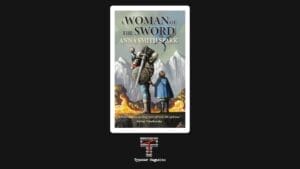By Emily Lynell Edwards
By most accounts, there’s never been a sexier time to be a reader. The romance genre is making so much bank there’s a romance-only bookstore boom. The fae are so hot in A Court of Frost and Starlight frigid Republicans are trying to ban people reading about them. “Romantasy” is officially in, (although, I’m begging y’all to work on that name). Colleen Hoover, queen of shocking plot twists is a New York Times Best Seller. You’re looking for a book where the heroine fucks a door? Don’t worry, we have you covered.
Yet, I smell a rat. There’s something sinister going on in our reading culture behind glowing headlines extolling the romance genre’s success. It’s not merely playing out in our legislatures, but on BookTok, the side of the app devoted to discussion of books and reading, and in literary criticism. Other writers have clocked the trend in television and film; “that everyone is beautiful, and no one is horny.” While the romance genre ostensibly seems replete with smut, this trend of neopuritanism is coming to a bookstore near you. And it’s not only championed by far-right politicians but readers themselves. Readers are arguing for a return to “clean,” classical literature focusing on “pain, love, passion, and deep thoughts,” which apparently is antithetical to sex. Readers and critics alike are condemning the representation of sexual dynamics that are morally troubling to progressive or even polite sensibilities. In other words, the call is coming from inside the house. But, playing on Roland Barthes’ musings, must the birth of contemporary reader criticism be ransomed by the death of the fuck?
And these developments extend beyond literary circles. Over the last decade we’ve witnessed the development of a far-right reactionary politics that focuses on the disciplining of desire. Sex of all varieties must be controlled in legal systems, in the home, and in cultural industries. We’ve been confronted with an onslaught of legislation attempting to roll-back access to abortion, contraception, fertility treatments, and witnessed the passage of anti-queer, specifically anti-trans laws. Crucially, within literary and educational contexts, conservatives have also attempted to ban books which contain alleged “explicit” content in schools, libraries, and even commercial bookstores.
Even as troubling as these trends are, however, they are well-identified and being vigorously contested even if it’s by an increasingly beleaguered coalition of activists, scholars, librarians, authors, and nonprofits. What is more pernicious, though, is a growing trend from readers themselves, sourced and circulated on BookTok, a major driver of contemporary reading trends and book product, who are voicing loudly the condemnation of representations of human desire that ostensibly run contrary to feminist politics. Or, as Raquel—romance reader and critic under the name BuffyReads on TikTok—captures this reader archetype in a video, the “classics woman who thinks spicy books are the death of literature.”
The argument made by these readers is pretty simple, because it has to be in order to be hashtagged and circulated in bite-sized videos. Let me recount it for you.
Readers, predominantly women, are in some vague fashion ruining literature by preferring and consuming books which have substantial “spice,” social media speak for sexual content as part of the narrative. This preference is causing broad “brain-rot,” which is shorthand for the intellectual degradation of our society. Often, this argument comes from younger readers themselves, see Kiesse N. Nanor’s cautionary take-down of “literary pornography” here.
But established critics have fallen afoul of neopuritanism too, see Alexandra Jacobs, critic for The New York Times Book Review, snidely suggesting that a certain tampon sex scene in Miranda July’s flirty new novel All Fours (2024) is “graphic” and “gross.” The youth might be given a pass, but Jacobs could grow up. In a lit crit round-up in Angel Food reflecting on the different styles and functions of sex scenes in commercial and literary fiction, author Sophie Kemp of forthcoming novel Paradise Logic pushes back against the prudish impulse of contemporary fiction, arguing for the primacy of sex scenes in literature: “I don’t care if it grosses people out or if I’m taking it too far. I love having sex. It’s something I think about constantly. Why not write about it?” This is because, as Kemp argues using Sheila Heti’s How Should a Person Be? (2010) as one example, we “write about fucking [because there is] agency in the fucking.”
Does this argument ring a bell? If so, that’s because the talking point is stunningly similar to debates regarding the proliferation of novels in the 18th century and how they could potentially introduce new types of moral rot, particularly amongst overly suggestable women readers, as outlined by Nicholas Hudson. Certainly, we can recall Jane Austen’s own cautionary tale of Catherine Moreland in Northanger Abbey (1818). Catherine’s overzealous consumption of Gothic romance almost spoils her happily ever after (or as Romance fans abbreviate it, “HEA”) with Henry Tilney when she accuses his father of murdering his mother. RIP Catherine, you would have loved the dark romance genre and Kindle Unlimited.
Today, readers increasingly posit that literary representations of erotic content, including dynamics or actions which we may condemn morally as enlightened feminists, contribute directly to sexual inequality, violence, and my personal favorite, threatens “the children.” And again, even in seemingly (center) left venues, like The Guardian, the anxiety over the proliferation of sexual content in literature is palpable.
Brandon Taylor, author of The Late Americans (2023) and Filthy Animals (2021), has reflected upon this trending critique of any representation of sexual content, violence, and trauma, as both gratuitous and unnecessary in literature writ large. He diagnoses the crux of the issue as the transformation of our platformed digital economy where today, attention is “the key currency of our time.” Consequently, “[b]y paying attention to anything, we are endowing that object or subject with a great deal of power and influence.” Hence, in our contemporary reading culture, which is now dominated not merely by social media platforms like TikTok, but by algorithms and digital platforms from Amazon, to Goodreads, to OverDrive, which seek to datafy our attention and reading habits, a dynamic deftly explored by The Privacy Settings Collective, spending time or attention on reading “smut” is a de facto approval of it.
Thus, amongst readers with presumably progressive politics, the impulse to condemn the inclusion of possibly disquieting sexually graphic content increasingly aligns with far-right groups interested in a similar ethicization of sex, albeit from the counter ideological position. This leaves readers in the crosshairs.
As political theorist Nathan Duford has argued, far-right, (neo)fascist ideology cannot solve the problem of human desire, this is to say, it is unable to imagine relations of equitable intimacy. Therefore, it aims to discipline and situate desire in the service of the state, the reproduction of the white, nuclear family if it is to be confronted at all. But the left hasn’t solved the problem of desire either.
We had the unsatisfying “hook-up” culture push of the 2000s which eventually bled into #MeToo and a national reckoning over the relationship between sex, power, and labor. We discussed affirmative consent. We all read Kristen Roupenian’s “Cat Person” essay. Aziz Ansari was briefly canceled for sexual misconduct or miscommunication depending on the publications you read. Harvey Weinstein finally went to prison. We called Amber Heard a liar and then changed our minds. We’re pretty sure the sexual revolution failed, or at least has left us vaguely unsatisfied, according to reigning “post left,” aka new right media personalities. But what happens after that? We haven’t quite decided. Other than maybe opting out of fucking entirely, a position increasingly championed by younger generations, Gen Z in particular. Sex remains fraught both politically and personally. Presumably in literature, and in the romance genre in particular, there is an opportunity to explore thoughtful and political mediations of sex and power. Yet, there remains a dialectical reaction amongst readers and publishers to graphic sexual content within the genre, despite its market dominance.
What is particularly disconcerting within this conservative milieu is the sexist denigration of readers who enjoy reading about sex in books, which seems to be inspired by a pernicious redux of the second-wave anti-porn feminist movement, as explored by Julia Long. But once this critique is over, there appears to be no affirmative, not to mention interesting, representations of what sex might look like in our literary culture, much less in our personal lives.
Ultimately, both the right and left are correct to emphasize that sex and its depictions are political. But we’re entering a dangerous phase where neoreactionary and neoliberal interests, two sides of the same coin, are making complementary arguments about the danger of sex in mainstream culture. What we end up with is both soft and hard censorship of sex. Soft censorship can manifest via Amazon’s shadow banning of erotic romance by removing tagged titles from algorithmic recommendations, a death blow to indie authors. Hard censorship can take the form of legal book bans. And the risk here is worse than simply boring, unsexy books, but books which pose no problems to existing power structures.
As Shakespeare scholar and BookTok influencer Carson Brakke notes, many of these critiques not only are intellectually weak, forwarding some “vague moral outcry around the idea that reading erotic content is somehow bad,” but more fundamentally, often fail to hold up to their contention that classic literature is a paragon of moral virtue and intellectual meaning whilst also being devoid of sex and desire. See D.H. Lawrence’s Lady Chatterley’s Lover (1928) or even Heathcliff digging up Catherine’s body in Wuthering Heights (1847). We’re supposed to pretend that isn’t hot?
And when we turn to contemporary romance, frequently we see critiques over graphic, often violent depictions of sex as directly aligned with the moral debasement of the gullible feminized reader. The subgenre of dark romance, Haunting Adeline (2021) from H.D. Carleton is one example of a favorite target, and its familiar tropes and depictions of sex; see the heroine fucking a gun, bloodplay, or stalking, is positioned as “bad” representation.
Yet, does that mean these texts should not exist? Other readers have recognized the tension of such broad condemnations of morally objectionable content with the tongue-in-cheek trend of reading Lolita (1955) and making theatrical faces of offense or a thumbs down visible to passerby. This is so your seatmate on the subway won’t think you’re in agreement with Humbert Humbert’s transgressions during your commute. Of course, the ubiquitous and uncritical depiction of certain sexual acts, see choking in hard-core pornography that increasingly has manifested in teenage romantic encounters, is a serious problem. But is the solution to return to cultural representations devoid of any sex?
This fantasy within certain reader circles, to return to classical literature, which we see from the David Foster Wallace bros to the “classics girlies’ ‘ obsessed with reading Dostoevsky, is ultimately to elide any engagement with the messy politics of desire. And a core part of what makes this current trend of neopuritanism so intellectually exhausting is that folks have already make the argument for the significance of the romance genre, see the Smart Bitches, Trashy Books project from Sarah Wendell and Candy Tan or A Natural History of the Romance Novel from Pamela Regis (2007).
Rehashing this argument distracts us from asking some more pressing questions. Chiefly, who wins when neoreactionary anti-sex trends collide with malformed leftist neopuritanism? Well, it’s not writers, it’s not readers. It’s capital.
There is money in romance. Dark romance where the hero holds the heroine hostage, alien romance where the hero doesn’t have blue balls but does have a blue dick, contemporary romance where the movie star falls in love with his assistant, and historical romance where the viscount falls in love with the governess.
But by making the inclusion of sexually explicit content subterranean to mainstream contemporary literature and book culture, entities like Amazon and the Big Five publishers win, see Dan Sinykin’s analysis of the consolidation of the postwar publishing industry in Big Fiction (2023), which only underscores the homogenizing effects of capitalism upon literary creation. Corporations like Amazon, with its Kindle Store, which possess a monopoly on the distributive infrastructure of e-books reap the benefits. Amazon is able to capitalize upon a thriving indie romance subculture of self-published authors but arbitrarily removes books for the inclusion of “offensive content,” which is capriciously defined and typically affects authors who are writing romance with poly, queer, or dark content. Conversely, traditional publishers like Berkley Books, a Penguin imprint and part of the Big Five, get to republish Ruby Dixon’s iconic Ice Planet Barbarians series after she’s done the hard work of cultivating an audience.
And if you’re a romance reader who wants hot books? Good luck trying to get one at your library given censorship trends or attempting to navigate Libby or OverDrive given the platform’s sale to a venture capital firm KKR, that has increasingly degraded the service via a slow process of “enshitification.”
There’s always Kindle Unlimited, or your local Barnes and Noble, except Republican legislatures are attempting to interfere with the free market and ensure that much like Playboy, Sarah J. Maas’ books are kept away from prying eyes. It’s dangerous to simply rely upon the market to provide if we can simply pay for it. Much like how abortion care will still be accessible to affluent women who can travel out of state, hot books will still be available to those who can pay. If we value a democratic reading culture, however, this cannot be a solution. The market and BookTok’s reticence to engage seriously with books that fuck results in fewer books that fuck well. Or, more high-mindedly, we end up retreating from critical conversations about desire and power.
As Taylor has argued, “[w]e act though art provoking us or unsettling us or showing us something gruesome is an actual harm. Something being in bad taste is not, like, a moral lesion.” Depictions of sex in literature and in romance in particular, much like the actual sex people have in real life and not in Bridgerton, is not always beautiful, occasionally messy, and sometimes bad.
As a reader who hates capitalism and fascism and loves Ruby Dixon and Thomas Hardy, I see this simmering reader rejection of sex most difficult to address as it requires a coordinated intellectual response, which is increasingly difficult in a fragmented media environment. We can no longer pop off an essay in The Paris Review that inaugurates a sea change in literary criticism and call it a day. Broadly speaking, the democratization of criticism is a good thing (see: Typebar Magazine Issues 1-3). But it is imperative to engage with representations of sex in literature and to develop a robust public criticism instead of merely content creation which uncritically celebrates book consumption, as Jessica Pressman explores in Bookishness (2020).
What will not save us is a defense of literature from a consumerist perspective, as this is fruit of the poisoned tree. Daniel Alexander, BookTok influencer, attempts to argue for the value of smut and “low-brow,” erotic literature by championing consumer choice: “these books are reality television show garbage,” but merely part of the menu of choices a reader is offered in the popular market. However, what this defense does is twist us in a pretzel, with Alexander going on to contend that the problem isn’t smut per se but taking it seriously; “…if you’re writing an analytical essay on the schadenfreude present in Ice Planet Barbarians you’ve missed the fucking point of the novel.” Consumer choice is not a solution.
Stuart Hall did not write “Notes on Deconstructing ‘The Popular’” for readers and reader-influencers to toss out an entire genre as mere entertainment. We can acknowledge as Hall does that “[c]ultural domination has real effects,” yet, like Hall, I find the “notion of the people as a purely passive outline force” within the larger literary field “deeply unsocialist,” and thus as a reader and scholar invested in liberatory, anti-capitalist, and feminist readings, I cannot accept it. In the tradition of Hall, I contend that popular romance, whether commercial or indie, can be transgressive, critical, and perhaps revolutionary.
This is not as Alexander suggests, “an advertising issue,” of merely slotting the correct trope into the correct reader’s hands. It is an issue of whether we as readers are willing to take on a program of intellectual and ideological work. As bell hooks argues, if we align ourselves with a feminist stance, we must recognize that “erotic longings, informs our politics,” and thus we are required to interrogate our desire. hooks here writes about the racialized dynamics of longing and desire in the larger context of Othering in American popular culture (2006). Yet, we can extend her critique to specific cultural formations, romance novels, and industries, the publishing sphere. Instead of washing our hands of sex entirely or retreating to the safety of consumer choice, perhaps we can question these longings and how they inform our political projects.
Sarah MacLean, romance novelist of the Hell’s Bells series, and Jen Prokop, romance editor and critic, on their podcast Fated Mates offer one model of public criticism. In one memorable episode, they, alongside author Mila Finelli, critically deconstruct and analyze the proliferation of “breeding kink” elements in romance and erotica against the backdrop of the dissolution of reproductive rights and a burgeoning reactionary misogynistic politics. This is the type of incisive criticism we can engage in when we move beyond superficial rejections of the material representation of erotics towards contextual readings.
It is scholars like Brakke, critics like Prokop, and authors like MacLean that make me hopeful. And there is movement within both the indie and traditional publishing space that suggests perhaps we are turning a corner. Miranda July’s All Fours (2024) is both a sexy and thoughtful mediation of identity and want centering a middle-aged woman. Harley Laroux, indie erotic horror author, has her books in my local Brooklyn Barnes and Noble. Ali Hazlewood, STEM romance queen extraordinaire, has officially mainstreamed sexual acts you’d typically find in an Archive of Our Own (AO3) tag in her latest novel Bride (2024). Authors are putting in the work and it’s time for us as readers to do so as well.
Years ago, Roland Barthes argued that in killing the author we released the text and literary criticism from a singular “theological” meaning, thereby opening up space for more generative interpretations. Barthes noted presciently that “one place where this multiplicity is collected, united, and this place is not the author, as we have hitherto said it was, but the reader.”
In line with Barthes’ liberation of the text, I would like to liberate the fuck by refusing as Barthes once said of the author, to treat the subject as imbued with some singular, secret “ultimate meaning,” instead inviting multiple readings and engagement. The ball is in the court of readers, it has been since 1967. The question is, whether as readers invested in fantasizing, we can choose the hard work of interrogating these textual erotics, however unsightly they may be to us as individuals, to then fantasize new collective relations, of sociality, labor, and, maybe even pleasure.
Emily Lynell Edwards is an Assistant Professor of Digital Humanities in Brooklyn. She serves as a General Editor at Digital Humanities Quarterly. Her academic monograph, Digital Islamophobia: Tracking a Far-Right Crisis, was released in 2023 with De Gruyter. Her writing on topics including internet beauty trends, BeReal, and celebrity vampires has appeared in Black Lipstick, Flow, and Polygon. She is a fan of cyberspace and iced Americanos.





